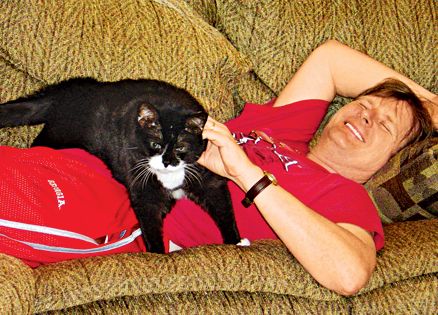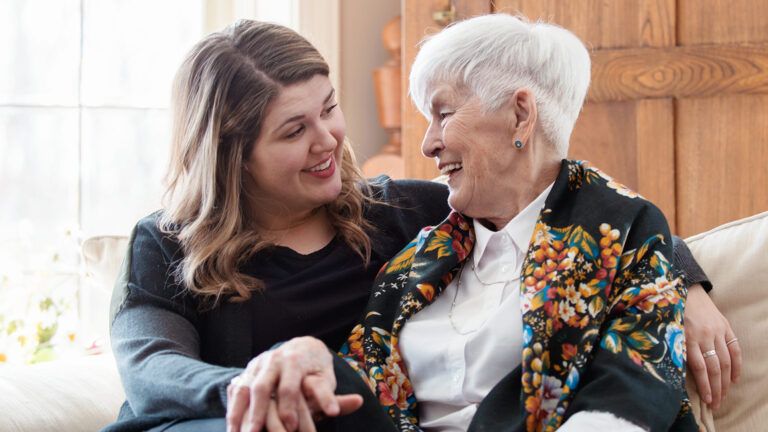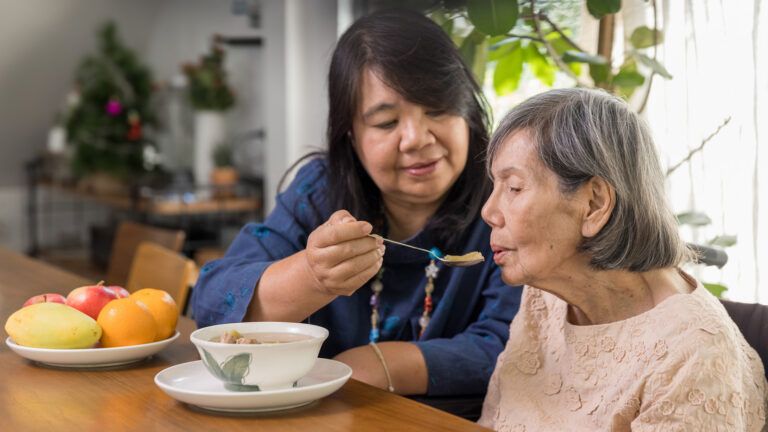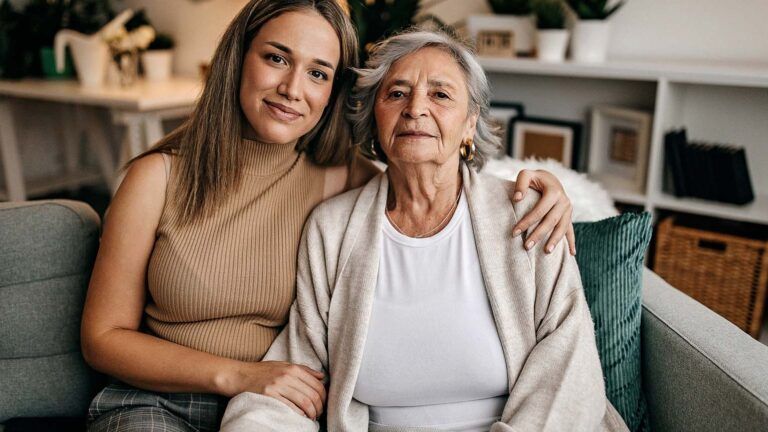One a.m. and I couldn’t sleep. Rather than wake my husband with my tossing and turning, I’d escaped to the living room. I stared at my laptop screen, clicking aimlessly between websites. This was what stress had driven me to—the stress of having my ailing 84-year-old mother-in-law and my 22-year-old daughter and her husband living in my house, all requiring help in some way.
I was spent—and more than a little disheartened. I sank back into my old recliner. God, was it wrong for me to have had such high hopes for retirement?
It had been two years since I’d packed up my classroom. After 32 years as an English teacher, tethered to class bells and the public school calendar, I’d been thrilled to take control of my own schedule. I envisioned a future of leisure and adventure—John and me traveling, just the two of us doing whatever we wanted, whenever we wanted.
“What about an Alaskan cruise?” I’d asked, grinning.
“Or the Bahamas in January,” John added.
We’d dreamed of crossing off bucket list items that had been delayed by raising and supporting our family. Selfish? No, self-fulfilling.
I’ll have quiet time too, I’d thought. Time to write and to read the stacks of books on my shelf, which had been gathering dust for years. I imagined lounging on the sofa, totally engrossed in a new novel, my days of grading essays on The Great Gatsby far behind me.
My fantasies were short-lived. Five months after my June retirement, my daughter, Allison, called from Orlando, where she and her husband lived.
“We’d like to move back to Brunswick to finish my degree,” she said. “Brandon and I can’t afford to live here and pay for college at the same time. Would it be okay if we moved back into the house?”
When they’d first moved to Orlando, we told them they were always welcome back home if they needed help. Much as John and I were enjoying life as empty nesters, we knew the best solution was for Allison and Brandon to live with us while she attended college here in town. So we agreed without hesitation.
Allison and Brandon moved in just before Christmas. We crammed one room, floor to ceiling, with their belongings: tables, chairs, lamps, desks, storage tubs. Couldn’t they have downsized? I thought as we shoved larger items into the garage. A second room became their living area and bedroom. Their two cats, along with our three, made for a rambunctious five-feline household.
This will be okay, I told myself. It’s not forever.
A month later John came home from work with a grim expression. “Mom isn’t doing so well.”
John’s mother, Betty, affectionately called Granny, lived an hour away. She’d been suffering lower back pains, and her doctors practiced in our larger town. It made sense for her to come live with us, at least until she was strong enough to live on her own again.
“I’m sorry to be a burden,” Granny said.
“Not at all,” I assured her. “We’re happy to have you.”
And really we were. Granny and I had always gotten along well, and I knew she valued her independence. I felt guilty even considering how this could put a damper on my retirement.
Inevitably the chaos of a multigenerational household chipped away at my dreams of leisure and adventure. John and I were suddenly the glue trying to keep everything and everyone stable. I’d heard the term sandwich generation before, but I’d never emotionally understood what it meant.
One evening, my mother-in-law collapsed as John walked her to the bathroom. I frantically dialed 911. Granny was hospitalized and diagnosed with C. diff, a highly contagious bacterial infection. We were terrified, both for her and our crowded home.
John, the kids and I sterilized her bedroom, the bathroom, her linens, her clothing. All of us monitored ourselves for symptoms. Fear gripped my heart. Would the whole family get sick? Would I be able to take care of everyone?
No one else fell ill, thank goodness. My mother-in-law was released and returned to our house. Then she got shingles, which caused lingering pain in her back and legs. I shuttled her to and from doctors’ and physical therapy appointments when John couldn’t take time off work to do it. I often sat in waiting rooms, playing games on my phone during Granny’s treatment.
On top of everything, I wanted to be a good mother to Allison and Brandon. Although we all took turns cooking, buying groceries and doing chores, I would still ask, “What do you want for dinner?” “Do you have enough space to do schoolwork?”
Brandon had a full-time job, and Allison worked and did an internship in addition to her classes. Because I had more free time, I didn’t feel I should ask them to help manage the household and take care of Granny. Wasn’t that my role, after all, in this season of life? If I could just grin and bear it a bit longer, we’d make it through.
Teaching had been hectic, but sticking to a schedule and knowing what was expected had grounded me. I felt alive in the classroom. I liked getting things done and helping others, especially teenagers. Besides, I could count on going home at the end of the day.
Now my days and nights were a tangle of stress, insomnia and conflicted feelings. I felt deeply disappointed that things hadn’t turned out the way I’d hoped. After more than three decades in public service, didn’t I deserve some time to rest and have fun? Then I felt guilty for not acting with more patience and grace.
God wouldn’t have asked me to sacrifice for my family if he didn’t think I could handle it, right? But most nights, the only prayer I could voice was a whispered “Help!”
Allison, noticing my erratic sleep schedule, asked if I needed to talk to a professional. “Brandon and I love you, and we’re here for you,” she said one night. “But we’re worried about you. You don’t go out. You don’t see people. We think you’re depressed and need help. I can help you find a therapist.”
How could I tell her the truth? I wasn’t sure I’d feel right again until everyone moved out and I had my life back.
Instead, I nodded. “Sure, honey. I’ll think about that.”
Nothing had changed since. Here I was again, sitting in my recliner at 1 a.m., staring at the laptop screen. Too stressed to sleep, too drained to do anything productive. I clicked from page to page until I landed back at my e-mail. Was that an unread message from my old supervisor? How had I missed it?
Hi, Lori. Hope retirement is going well! Are you ready to return to school? We need tutors to prep the juniors for state tests. Let me know.
I pulled the recliner upright. Before I might have scoffed at an offer to return to school—“I’m too busy relaxing!”—but now I felt a surge of excitement. I could get out of the house, stop focusing on being the glue that held everyone together, be a helper on my own terms again.
Yes! I’d love to come back, I wrote.
Teaching is demanding like caregiving, but unlike caregiving, teaching activates something in me. Many teachers will tell you that working with young people is just plain fun. I couldn’t wait to go back.
First I needed to get past the feeling that I couldn’t ask for more help. I told Allison and Brandon I’d be returning to teaching part-time. “Can you keep an eye on Granny while I’m at work?” I asked Allison.
“No problem. Happy to.”
“Brandon, would you take care of dinner the days I’m working?”
He smiled. “Sure. I’ll defrost some chicken.”
From the very first day back, the work was invigorating. The juniors and I brainstormed essay topics. “Your thesis statement needs to clearly identify the topic,” I explained, “and address the points you’ll make later.” Should students wear uniforms and why? Is it humane to keep exotic pets? Should we ban tobacco products? My students were awash with ideas.
I’d come home from tutoring feeling more upbeat than I had in months. “Can you believe what one of my students said?” I’d tell my family, laughing. Sure, I was tired—but not drained.
In fact, I had more energy. Energy to talk to Allison about her classes, to be a better caregiver to Granny and even to read a few of the books languishing on my shelf. My daughter was right; I had been depressed. Getting out of the house and doing something I loved made my life mine again, even if our home was more crowded and chaotic.
A year after I returned to teaching—and a year and a half after moving into our house—Allison graduated with her bachelor’s degree. She and Brandon (and the cats) happily returned to Orlando, where they are thriving.
My mother-in-law recovered and moved back into her own house. She still spends time with us, but she has regained much of her independence.
John and I are enjoying the peace of our empty nest. We’ve taken some small trips, and we dream of traveling to new places together.
I don’t know what would’ve happened if my family hadn’t all moved in. Would I have been bored home alone? Gone stir-crazy? I’m not sure I would have found my way back to the classroom, at least not so quickly. Yes, God had called on me to be a rock for my family, but that didn’t mean sacrificing all my own needs. What I learned was not just to be a caregiver for those I love dearly but for myself as well.
Read more: 5 Ways to Rethink Retirement
For more inspiring stories, subscribe to Guideposts magazine.






